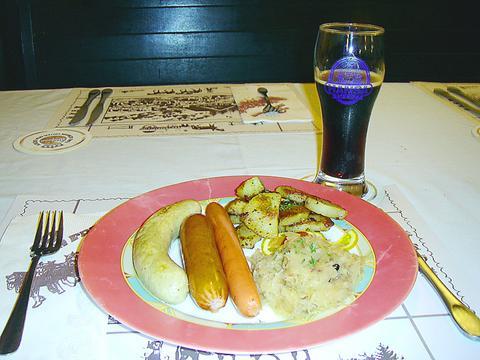Qi Tiao Tong (
Zum Fass (

PHOTO: CHRIS FUCHS, TAIPEI TIMES
But why put a German-Swiss restaurant here? "This building used to have a Swiss air-conditioning company in it," said Jack Hsu (
In the beginning, the beer took priority over the food, Hsu said. Most of the dishes were made by the wives of Swiss businessmen who worked upstairs. It wasn't until a bit later that a Swiss cook was flown over and hired to create standard restaurant fare. Those recipes are the ones that are still used today, Hsu said.
The menu has over 50 selections, with such Swiss and German specialties as gemischte wurst (a variety of German sausages) and schweinshaxe (roasted pig knuckles), which Hsu said is a favorite among his customers.
The gemischte wurst includes three types of sausage: veal, cheese and frankfurter. None of them is overly sweet. A healthy portion of homefries and imported sauerkraut -- which doesn't have that from-the-can-sour taste -- rounds off the meal.
The perennial favorite at Zum Fass, though, is roasted pork knuckle. Hsu said pork knuckle is often fried to make it crispy. Zum Fass, however, roasts its pork knuckle for more than three hours, allowing the skin to gradually turn dark red and the meat tender.
What would German food be without German beer? Zum Fass's draft selection is Warsteiner Vorn Fass. Erdinger (in three different varieties) -- Kristallklar, Dunkel and Hefe -- is also available in the bottle.
Hsu said Zum Fass hasn't changed one iota since it opened in 1977. Consistency, he said, is what has made his restaurant stand out among his neighbors along Qi Tiao Tong.

April 14 to April 20 In March 1947, Sising Katadrepan urged the government to drop the “high mountain people” (高山族) designation for Indigenous Taiwanese and refer to them as “Taiwan people” (台灣族). He considered the term derogatory, arguing that it made them sound like animals. The Taiwan Provincial Government agreed to stop using the term, stating that Indigenous Taiwanese suffered all sorts of discrimination and oppression under the Japanese and were forced to live in the mountains as outsiders to society. Now, under the new regime, they would be seen as equals, thus they should be henceforth

Last week, the the National Immigration Agency (NIA) told the legislature that more than 10,000 naturalized Taiwanese citizens from the People’s Republic of China (PRC) risked having their citizenship revoked if they failed to provide proof that they had renounced their Chinese household registration within the next three months. Renunciation is required under the Act Governing Relations Between the People of the Taiwan Area and the Mainland Area (臺灣地區與大陸地區人民關係條例), as amended in 2004, though it was only a legal requirement after 2000. Prior to that, it had been only an administrative requirement since the Nationality Act (國籍法) was established in

Three big changes have transformed the landscape of Taiwan’s local patronage factions: Increasing Democratic Progressive Party (DPP) involvement, rising new factions and the Chinese Nationalist Party’s (KMT) significantly weakened control. GREEN FACTIONS It is said that “south of the Zhuoshui River (濁水溪), there is no blue-green divide,” meaning that from Yunlin County south there is no difference between KMT and DPP politicians. This is not always true, but there is more than a grain of truth to it. Traditionally, DPP factions are viewed as national entities, with their primary function to secure plum positions in the party and government. This is not unusual

US President Donald Trump’s bid to take back control of the Panama Canal has put his counterpart Jose Raul Mulino in a difficult position and revived fears in the Central American country that US military bases will return. After Trump vowed to reclaim the interoceanic waterway from Chinese influence, US Defense Secretary Pete Hegseth signed an agreement with the Mulino administration last week for the US to deploy troops in areas adjacent to the canal. For more than two decades, after handing over control of the strategically vital waterway to Panama in 1999 and dismantling the bases that protected it, Washington has